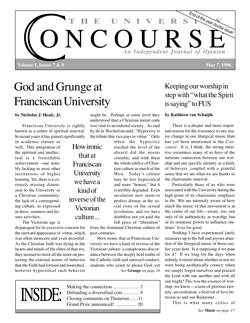The first annual Concourse Grand Prize
by the editors
Announcing:
The first annual Concourse Grand Prize
Dinner for two at the
Grand Concourse Restaurant in Pittsburgh
to be awarded to the author of the article
(excluding those by staff and board members),
which, in the judgment of the editors,
best reflects the Concourse ideal of fruitful Christian discourse.
This year’s winner is Associate Professor of Theology
REGIS MARTIN
for the following piece,
published in our second issue:
Congratulations on your maiden issue! It looks as if you’ve launched a wise and worthy endeavor. Long may it prosper!
I particularly want to commend you for your statement of purpose, set out most ably on the Editor’s Page; the invitation to honest and intelligent debate, conducted with charity, is a worthwhile pursuit. And in that irenic spirit might I take issue with a sentence you wrote? “Even the doctrines of our Faith, though given to the Church once and for all, were not given in finished form, but rather as ‘seeds’, so that our understanding of them has been emerging only gradually across centuries of Christian experience…” I think I understand what you mean here and I’ve no quarrel with it. But an implication survives its intended meaning, fed by an ambiguity you doubtless had not intended, which strikes me as unfortunate.
In the first place, what was given to the Church two millennia ago were not doctrines to be unpacked over time, but a Person to be encountered in time and at any time. Christ is not therefore any sort of seed whose growth we may chart gradually over the course of centuries, those of us privileged to live at the end of the 2nd millennium somehow better situated to interpret His message. Rather He is the Word whose enfleshment took place at a particular time and thus all time is intersected, all history suffused, with his Gracious Presence.
And, point two, to the extent His coming has vouchsafed certain doctrines which the Church holds in her memory, these are not understood in a better or richer or deeper way simply in virtue of one’s having lived at a later date; to think that is to fall prey to that “chronological snobbery” C.S. Lewis warns against. St. Iranaeus, for example, who is rightly regarded as the Father of Western Theology, advanced an understanding of the Incarnation back in the 2nd century (see his stunning polemic against the Gnostics who contested the Event), which I don’t think modern thought is likely to supersede any time soon. The same might be said of Augustine’s psychology of conversion (see Book VIII of his Confessions). There are of course other examples I might cite. But the point of them all is to remind us, in humility, of numberless “dead Masters” whose accumulated wisdom provides the patrimony on which we, their grateful heirs, draw.
Once again, congratulations on what you’ve done and may the forum you’ve created flourish amid the University community.
(For the editors’ stupendous reply to this piece, please see the same issue.)
The editors selected this article, among several worthy contenders, for its lovely language, its cheerful spirit, its kindly criticism and its Christian purpose. It represents exactly the sort of delightful and intelligent conversation the University Concourse was designed to foster. Also, we wanted to show how exceptionally large-minded the Concourse editors are, in our willingness not only to publish, but to republish and reward an opinion not unmixedly flattering to ourselves.
Stratford Caldecott’s April 23 reply to Michael Welker’s article: “God and Caesar,” came in a close second, and deserves honorable mention for its courtesy, conciseness and clarity. But since, being in England, he is unlikely to benefit from a dinner for two at a Pittsburgh restaurant, we propose, instead, to “make a return” by buying him a beer the next time we are in Oxford.
Our thanks and congratulations to both.


